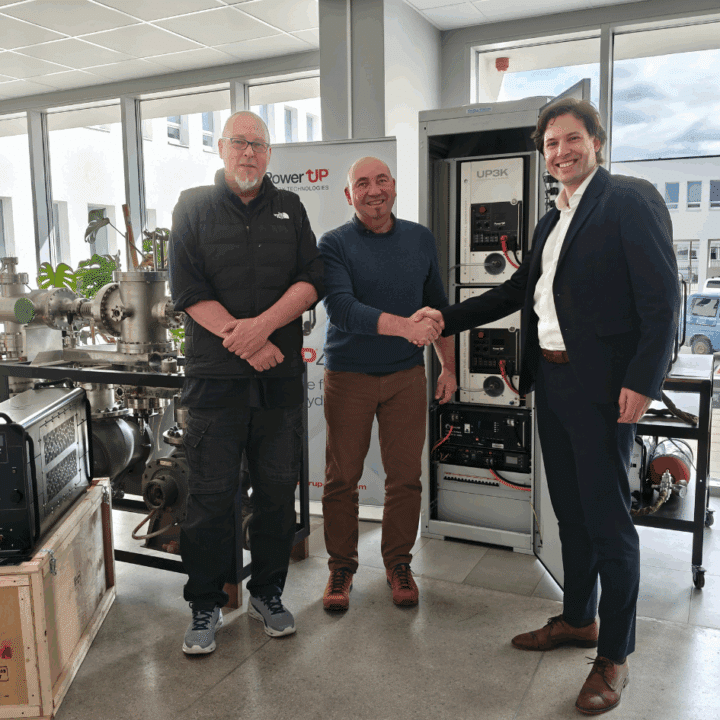
The Role of Hydrogen Generators in Achieving Sustainable Future
July 15, 2024
The Role of Tech Innovation in Achieving Global Climate Goals
January 9, 2025Alternatives to Diesel Generators: A Comparison for Industry Decision-Makers

Industrial backup generators are crucial for maintaining uninterrupted operations in critical industries. Diesel generators have been the preferred solution due to their reliability and cheapness. However, with increasing environmental concerns and the push for greener energy, hydrogen generators are emerging as a viable alternative.
This article delves into the benefits and challenges of switching to hydrogen generators, providing a detailed comparison for industry decision-makers.
Defining Diesel and Hydrogen Generators
Diesel generators use internal combustion engines powered by diesel fuel to produce electrical power. They are used as standalone or backup power units for various industrial applications. Noted for their quick startup times, fuel efficiency, and high power output, diesel generators have become a staple in the energy sector.
In contrast, hydrogen generators utilize fuel cell technology, converting hydrogen gas into electricity through a chemical reaction with oxygen, with water as the only byproduct. This relatively new technology promises higher efficiency and cleaner energy than traditional fossil fuel-based generators.
Despite both types of generators aiming to offer reliable power, their operational principles and environmental impacts vary significantly, which this article explores in depth.
History of Diesel and Hydrogen Generators
Diesel generators originated in the early 20th century, with significant adoption during World War II. Advances over the decades have made them quieter, more efficient, and more durable, leading to their widespread use in various sectors today.
The concept of hydrogen fuel cells dates back to the 19th century, but major developments occurred in the latter half of the 20th century. Initially used in aerospace, fuel cell technology has expanded to commercial and industrial applications, offering sustainable energy solutions.
The evolution of these technologies reflects ongoing efforts to improve efficiency, durability, and environmental impact, driving current interest in alternative energy sources such as hydrogen generators.
Challenges of Diesel Generators
One of the main challenges of diesel generators is their environmental impact. A single liter of diesel fuel emits approximately 2.7 kg of CO2, along with other pollutants like particulate matter and nitrogen oxides, contributing significantly to air pollution and climate change.
Another challenge is noise pollution. Even modern diesel generators, though quieter than older models, can still be disruptive, particularly in densely populated or sensitive areas. Regular maintenance is also essential, including oil changes, filter replacements, and system inspections.
Additionally, diesel generators can struggle in extreme weather conditions, necessitating adaptations like glow plugs or engine heaters to ensure reliable operation in cold climates. These challenges make diesel generators less attractive as regulatory and environmental pressures increase.
Advantages of Diesel Generators
Despite their challenges, diesel generators offer several benefits. They have high power output and can operate for extended periods, making them suitable for heavy-duty applications. Their fuel efficiency is notably better than that of petrol generators, leading to longer operational times.
Diesel generators are also known for their durability. They are designed to withstand harsh conditions and heavy use, providing reliable power in demanding environments. Safe storage is another advantage; diesel’s lower flammability compared to petrol reduces fire risks.
Moreover, diesel fuel is widely available, often transported alongside work vehicles that use it. This easy availability, combined with the generator’s efficient fuel consumption, makes diesel generators a convenient choice for many industries.
Challenges of Hydrogen Generators
Hydrogen generators, while promising, also come with challenges. Technological barriers such as efficient hydrogen storage and the durability of fuel cells need to be addressed. Currently, hydrogen storage requires specialized high-pressure tanks, complicating logistics and raising costs.
The initial cost of hydrogen generators and the necessary infrastructure for hydrogen fuel supply remains high. This includes production, transportation, and storage of hydrogen, which are not as well-developed as diesel fuel logistics.
Safety concerns are also significant. Hydrogen is highly flammable, requiring stringent safety protocols during storage and operation. Although advancements are being made, these challenges currently limit the broader adoption of hydrogen generators.
Advantages of Hydrogen Generators
The most compelling advantage of hydrogen generators is their environmental impact. Unlike diesel generators, hydrogen generators produce only water vapor as a byproduct, making them an ultra-low emissions option. This aligns perfectly with global efforts to reduce greenhouse gas emissions and combat climate change.
Hydrogen generators are also more efficient than diesel generators. Fuel cells can convert up to 60% of the fuel’s energy directly into electricity, whereas diesel engines typically operate at around 30-40% efficiency. This higher efficiency translates to less fuel consumption and lower operational costs over time.
Additionally, hydrogen generators are quieter, generating minimal noise during operation. This is particularly advantageous in environments where noise pollution is a concern, such as residential areas or wildlife conservation zones.
Real-World Applications
Hydrogen generators are finding traction in diverse applications. They are increasingly used in camper vans and off-grid homes, providing a silent and clean energy source perfect for remote locations. Construction sites have also started adopting hydrogen generators for their efficiency and low emissions.
A notable example is the maritime industry, where hydrogen generators are being used on yachts and sailing boats. This offers a sustainable alternative to diesel engines, aligning with maritime environmental regulations.
While diesel generators remain prevalent across many sectors, these real-world applications demonstrate the potential for hydrogen generators to offer reliable and sustainable power solutions in various settings.
Comparison Table of Key Features
| Feature | Diesel Generators | Hydrogen Generators |
|---|---|---|
| Efficiency (%) | 30-40 | Up to 60 |
| Emissions (g CO2/kWh) | 2.7 | 0 |
| Noise Level (dB) | 70-90 | 40-60 |
| Fuel Availability | High | Moderate |
| Maintenance Frequency | High | Low |
Bullet Points of Pros and Cons
Diesel Generators
- Pros: High power output, fuel efficient, long operational time, durable, safe storage.
- Cons: Significant emissions, noise pollution, regular maintenance required, struggles in extreme weather.
Hydrogen Generators
- Pros: Ultra-low emissions, high efficiency, minimal noise, lower maintenance.
- Cons: High initial cost, technological barriers, stringent safety protocols, moderate fuel availability.
Government Policies and Future Outlook
Governments worldwide are introducing policies to encourage the adoption of clean energy solutions. Subsidies and incentives for hydrogen technology research and infrastructure development are becoming more common, aiming to reduce costs and broaden adoption.
Various countries are revising their energy policies to support climate goals. For example, the European Union is pushing for a green transition to meet its climate neutrality goals by 2050, which includes policies favoring hydrogen over traditional fossil fuels.
Looking ahead, as technology advances and costs decrease, hydrogen generators are poised to become a significant part of the energy landscape. Industry decision-makers should keep an eye on these developments as hydrogen technology continues to evolve and potentially take over from fossil-fuel-based generators.
Conclusion
In conclusion, while diesel generators have been the industry standard for reliable backup power, hydrogen generators offer a more sustainable and efficient alternative. Although there are challenges to overcome, such as higher initial costs and technological barriers, the long-term benefits of hydrogen generators make them a compelling option.
The move towards hydrogen generators is supported by global trends and policies aimed at reducing emissions and promoting renewable energy. Industry decision-makers should consider these factors when planning future energy solutions.
Overall, adopting hydrogen generators not only aligns with environmental goals but also offers enhanced efficiency and reduced operational noise, paving the way for a cleaner and quieter industrial future.



